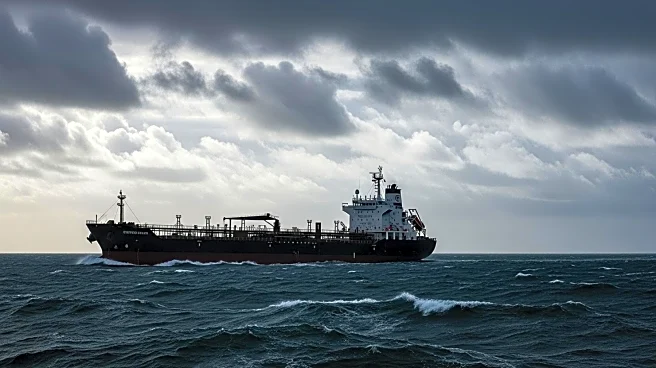What is the story about?
What's Happening?
The crude oil tanker Boracay, part of the so-called 'shadow fleet,' has once again managed to evade authorities after being detained by French officials. The vessel, which has been involved in multiple incidents of false flagging and obfuscation of ownership, was released after being held since September 27. Despite sanctions from the EU and UK, the tanker continues to operate, reportedly carrying Russian crude oil bound for India. The ship has been linked to various inconsistencies in its registration, having claimed registry in multiple countries including Benin, Malawi, and Gambia, all of which are suspected to be false flags. The French authorities released the Chinese captain and Chief Officer, who are expected to return to France for court proceedings. The vessel is currently en route to the Suez Canal, with an expected arrival on October 14.
Why It's Important?
The ongoing operations of the Boracay highlight significant challenges in enforcing international maritime regulations and sanctions. The ability of such vessels to continue operations despite sanctions undermines efforts by the EU and UK to control the shadow fleet, which is believed to facilitate the transport of sanctioned goods, including Russian crude oil. This situation poses a threat to the integrity of international trade laws and could potentially destabilize market conditions by allowing sanctioned goods to reach global markets. The European Union's new policy of obstruction aims to disrupt these operations, but the effectiveness of such measures remains to be seen. The incident also underscores the geopolitical tensions between Russia and Western nations, with Russian President Vladimir Putin condemning the actions as piracy.
What's Next?
The European Union is expected to intensify its efforts to curb the operations of the shadow fleet. French President Emmanuel Macron has announced plans for a European-led coalition to strategize on disrupting these operations. This could involve more stringent checks on vessel registrations and insurance proofs. The upcoming court proceedings for the Boracay's captain may set a precedent for how such cases are handled in the future. Additionally, the continued evasion by shadow fleet vessels may prompt further international cooperation to address the loopholes in maritime law enforcement.
Beyond the Headlines
The persistence of the shadow fleet raises ethical and legal questions about the enforcement of international sanctions and the responsibility of flag states. The use of false flags and the obfuscation of ownership complicate accountability and highlight the need for more robust international maritime governance. This situation also reflects broader issues of economic inequality, as countries with weaker regulatory frameworks are often exploited for flagging purposes. The long-term implications could include a reevaluation of international maritime laws and increased pressure on countries to adhere to stricter regulatory standards.
















